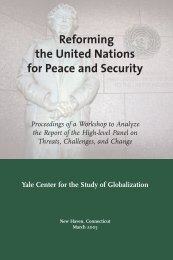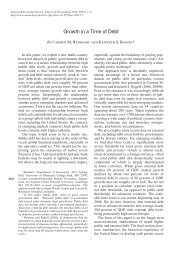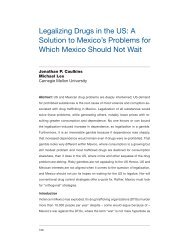The collapse of global trade, murky protectionism, and the crisis:
The collapse of global trade, murky protectionism, and the crisis:
The collapse of global trade, murky protectionism, and the crisis:
You also want an ePaper? Increase the reach of your titles
YUMPU automatically turns print PDFs into web optimized ePapers that Google loves.
<strong>The</strong> <strong>collapse</strong> <strong>of</strong> <strong>global</strong> <strong>trade</strong>, <strong>murky</strong> <strong>protectionism</strong>, <strong>and</strong> <strong>the</strong> <strong>crisis</strong><br />
Invest in people to obtain value for money<br />
As governments deploy stimulus packages to address economic crises, <strong>the</strong>y should<br />
aggressively pursue value for money <strong>and</strong> dem<strong>and</strong> high levels <strong>of</strong> customer satisfaction<br />
for <strong>the</strong>ir investments. In so doing, <strong>the</strong>re is no better investment governments can<br />
make than in <strong>the</strong> human resources that will spend <strong>the</strong> government's money.<br />
Few nations take this responsibility seriously. Many fall into <strong>the</strong> trap exemplified<br />
by <strong>the</strong> US Defense Department during <strong>the</strong> 1990's that, obsessed by its "tooth-to-tail"<br />
ratio, willingly jettisoned "shoppers" (or acquisition personnel) in favour <strong>of</strong> "triggerpullers"<br />
(or soldiers), only to find itself incapable <strong>of</strong> responsibly managing its critical<br />
procurement needs. Indeed, States ignore at <strong>the</strong>ir peril what children are taught at an<br />
early age: an ounce (or milligram) <strong>of</strong> prevention (here, a good purchasing decision, or<br />
a carefully crafted contract) is worth a pound (or kilogram) <strong>of</strong> cure (here, trying to salvage<br />
a bad bargain).<br />
States must promptly, dramatically, <strong>and</strong> aggressively invest in <strong>the</strong>ir acquisition<br />
workforces. <strong>The</strong>y need to identify, recruit, <strong>and</strong> hire <strong>the</strong> most talented business pr<strong>of</strong>essionals,<br />
engineers, quality assurance personnel, <strong>and</strong> attorneys in <strong>the</strong> marketplace.<br />
(As unemployment rises, recruiting talent should prove relatively easy.) States <strong>the</strong>n<br />
must <strong>the</strong>n provide <strong>the</strong>se business pr<strong>of</strong>essionals with <strong>the</strong> most current, realistic, <strong>and</strong><br />
skills-based training available. (After all, this type <strong>of</strong> hiring <strong>and</strong> skills enhancement<br />
initiative is <strong>the</strong> most direct type <strong>of</strong> stimulus, <strong>and</strong> it pays ongoing dividends.) <strong>The</strong>n,<br />
governments should deploy <strong>the</strong>se talented, skilled, incentivised procurement pr<strong>of</strong>essionals<br />
to get <strong>the</strong> taxpayers <strong>the</strong> most for <strong>the</strong>ir money. No nation can reasonably conclude<br />
that additional investments in personnel to improve its performance in any <strong>of</strong><br />
<strong>the</strong>se disciplines would not pay significant dividends. Ra<strong>the</strong>r, most would enjoy dramatically<br />
increased return on <strong>the</strong>ir procurement investments by streng<strong>the</strong>ning <strong>the</strong>ir<br />
capacity in each <strong>of</strong> <strong>the</strong>se critical areas. <strong>The</strong>re is no better time to do so.<br />
Recommendations<br />
For <strong>the</strong> pending economic stimulus efforts to succeed, procurement systems must<br />
perform efficiently <strong>and</strong> effectively, returning value in exchange for stimulus outlays.<br />
To fulfil <strong>the</strong>ir fiduciary responsibilities, leaders should:<br />
• Maximise competition for <strong>the</strong>ir governments' business among <strong>the</strong> <strong>global</strong><br />
economy's most qualified firms.<br />
Accordingly, governments must recommit <strong>the</strong>mselves to <strong>the</strong> letter <strong>and</strong> intent <strong>of</strong>,<br />
among o<strong>the</strong>rs, <strong>the</strong> WTO's GPA, bilateral commitments, <strong>and</strong> regional free <strong>trade</strong> agreements.<br />
But mere legal compliance is insufficient; a sustained <strong>and</strong> public commitment<br />
to open procurement markets is essential to avoid a downward spiral into <strong>protectionism</strong>.<br />
• Strive to purge corruption from procurement.<br />
Governments should press for implementation <strong>of</strong> <strong>the</strong> UN Convention against<br />
Corruption, elevating <strong>the</strong>ir level <strong>of</strong> engagement from words to deeds (<strong>the</strong> convention<br />
calls for specific procurement practices).<br />
• Build (or restore) capacity in <strong>the</strong>ir public procurement systems.<br />
Governments should invest stimulus resources in rebuilding <strong>the</strong>ir pr<strong>of</strong>essional acquisition<br />
workforces – aggressively recruiting <strong>the</strong> best talent, bolstering skills-based train-<br />
91





